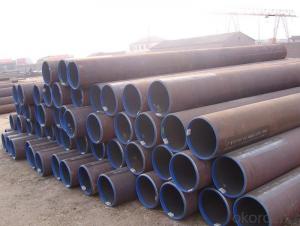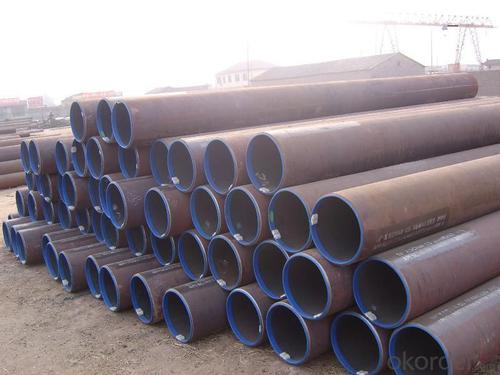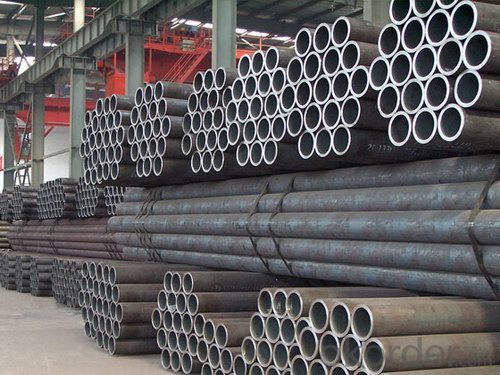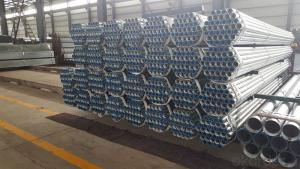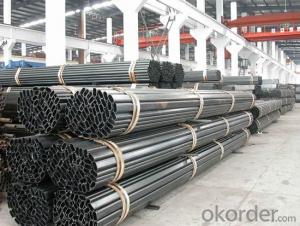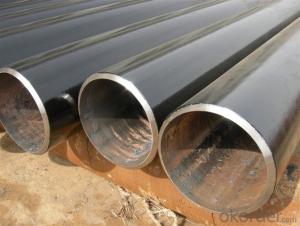Tube Pipe -The Welded Steel Pipe Production
- Loading Port:
- Tianjin
- Payment Terms:
- TT OR LC
- Min Order Qty:
- 25 m.t.
- Supply Capability:
- 7000 m.t./month
OKorder Service Pledge
OKorder Financial Service
You Might Also Like
1、Structure of Welded Steel Pipe DIN1829/EN10216-1:
Welded Steel Pipe is to be used for conveying gas, water, and petroleum foroil and natural gas industries. And used for structural steel pies purpose. We can produce any pipe and tube, and in order to meet client's demand, our engineer team is trying to do more professional.
2、Main Features of Welded Steel Pipe DIN1829/EN10216-1:
• High manufacturing accuracy
• High strength
• Small inertia resistance
• Strong heat dissipation ability
• Good visual effect
• Reasonable price
3、Welded Steel Pipe DIN1829/EN10216-1: Specification:
Standard | GB, DIN, ASTM ASTM A106-2006, ASTM A53-2007 |
Grade | 10#-45#, 16Mn 10#, 20#, 45#, 16Mn |
Thickness | 8 - 33 mm |
Section Shape | Round |
Outer Diameter | 133 - 219 mm |
Place of Origin | Shandong, China (Mainland) |
Secondary Or Not | Non-secondary |
Application | Hydraulic Pipe |
Technique | Cold Drawn |
Certification | API |
Surface Treatment | factory state or painted black |
Special Pipe | API Pipe |
Alloy Or Not | Non-alloy |
Length | 5-12M |
Outer Diameter | 21.3-610mm |
Grade | 20#, 45#, Q345, API J55, API K55, API L80, API N80, API P110, A53B |
Standard | ASME, ASTM |
1) Material:20#(ASTM A 106/A53 GRB.API5LGRB,GB),45#,16Mn,10#.
2) Specification range:OD:21.3-610mm,WT:6-70mm,length:6-12m or according to the requirement of clients.
3) Excutive standards:GB,ASME API5L.ASTM A 106/A53,Despite of the above standards,we can also supply seamless steel pipe with standard of DIN,JIS,and so on,and also develop new products according to the requirements of our clients!
4) Surface:black lacquered,varnish coating or galvanized.
5) Ends:Beveled or square cut,plastic capped,painted.
6) Packing:bundles wrapped with strong steel strip,seaworthy packing.
4、Packaging & Delivery
Packaging Details: | seaworthy package,bundles wrapped with strong steel strip |
Delivery Detail: | 15-30days after received 30%TT |
5、FAQ of Welded Steel Pipe DIN1829/EN10216-1:
①How is the quality of your products?
Our products are manufactured strictly according to national and internaional standard, and we take a test
on every pipe before delivered out. If you want see our quality certifications and all kinds of testing report, please just ask us for it.
Guaranteed: If products’ quality don’t accord to discription as we give or the promise before you place order, we promise 100% refund.
②How about price?
Yes, we are factory and be able to give you lowest price below market one, and we have a policy that “ for saving time and absolutely honest business attitude, we quote as lowest as possible for any customer, and discount can be given according to quantity”,if you like bargain and factory price is not low enough as you think, just don’t waste your time.Please trust the quotation we would give you, it is professional one.
③Why should you chose us?
Chose happens because of quality, then price, We can give you both.Additionally, we can also offer professional products inquiry, products knowledge train(for agents), we have professional manager team and engineer team and sales team, and we are keep in studying and find better way or a new way to produce high quality production.
6、 Welded Steel Pipe DIN1629/EN10216-1: Images:
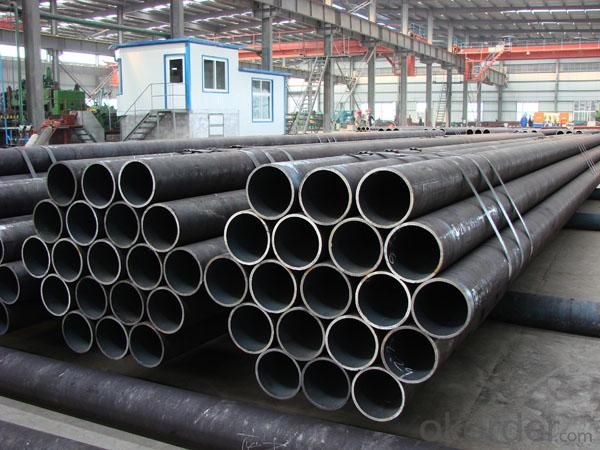
- Q: What are the different types of steel pipe fittings for industrial applications?
- There are several types of steel pipe fittings commonly used in industrial applications, including elbows, tees, reducers, couplings, unions, flanges, and caps. These fittings are designed to connect, redirect, or control the flow of fluids in a piping system, ensuring efficient and reliable operation in various industrial processes.
- Q: What is the elasticity of steel pipes?
- Steel pipes exhibit elasticity, which allows them to undergo deformation when external forces are applied and regain their original shape once the force is no longer present. The high elasticity of steel pipes is well-known, as it enables them to endure different types of stress and strain without suffering permanent deformation. This characteristic is vital in situations where pipes experience pressure, bending, or other mechanical forces. The elasticity of steel pipes is determined by material properties like its Young's modulus, which quantifies its stiffness and capacity to resist deformation.
- Q: What are the different types of steel pipes available?
- There are several types of steel pipes available, including seamless pipes, welded pipes, galvanized pipes, and stainless steel pipes.
- Q: How are steel pipes used in industrial manufacturing processes?
- Steel pipes are commonly used in industrial manufacturing processes for various purposes such as transporting fluids, gases, and solids, providing structural support, and facilitating heat transfer. They are used in industries like oil and gas, construction, automotive, and manufacturing, where they are utilized for plumbing systems, conveyance of materials, and as a durable and reliable medium for handling high-pressure and high-temperature applications.
- Q: What are the different types of steel pipe flanges?
- There are several types of steel pipe flanges, including slip-on flanges, weld neck flanges, socket weld flanges, threaded flanges, blind flanges, and lap joint flanges. Each type has unique features and is used in specific applications based on factors such as pressure ratings, pipe size, and end connections.
- Q: What are the different types of steel pipe fittings for chemical processing plants?
- There are several types of steel pipe fittings commonly used in chemical processing plants, including elbows, tees, reducers, flanges, and valves. Elbows are used to change the direction of the flow, tees are used to combine or split the flow, reducers are used to connect pipes with different diameters, flanges are used for connecting pipes and valves, and valves control the flow of fluid within the system.
- Q: What are the different types of steel pipe supports for offshore platforms?
- There are several types of steel pipe supports commonly used for offshore platforms, including but not limited to: 1. Clamps: These are used to secure and fasten pipes to the support structure, providing stability and preventing movement. 2. Hangers: These are used to suspend pipes from the support structure, allowing for flexibility and reducing stress on the pipes. 3. Guides: These are installed to control the movement and alignment of pipes, ensuring they stay in place and prevent damage during operation. 4. Shoes: These are used to support and distribute the weight of the pipe, typically at points where the pipe intersects with the support structure. 5. Saddles: These are designed to cradle the pipe and provide support, typically used for horizontal or inclined pipes. Each type of steel pipe support serves a specific purpose in ensuring the integrity and functionality of the offshore platform's piping system.
- Q: How are steel pipes used in the mining industry?
- Steel pipes are commonly used in the mining industry for various purposes such as transporting water, slurry, and other materials, as well as for ventilation and support systems in underground mines.
- Q: What are the factors affecting the price of steel pipes?
- The price of steel pipes can be influenced by various factors. These factors encompass: 1. Raw material expenses: The cost of raw materials like iron ore and coal significantly influences the price of steel pipes. Fluctuations in commodity prices can impact the overall production cost and subsequently affect the selling price. 2. Supply and demand dynamics: The price of steel pipes is determined by the interplay of supply and demand. When there is high demand and limited supply, prices tend to rise. Conversely, an oversupply and low demand can lead to price decreases. 3. Production and manufacturing costs: The direct impact of production and manufacturing expenses on steel pipe prices cannot be overlooked. Costs related to labor, energy, transportation, and equipment maintenance all contribute to the overall production cost and, consequently, the selling price. 4. Market competition: The level of competition within the steel pipe industry also influences prices. Increased competition among manufacturers and suppliers can result in more competitive pricing. Conversely, fewer competitors may lead to higher prices due to limited options. 5. Government policies and regulations: Government policies and regulations exert a significant influence on steel pipe prices. Import tariffs, trade restrictions, and environmental regulations can all affect production costs and subsequently impact prices. 6. Currency exchange rates: Currency exchange rates can also sway steel pipe prices. Fluctuations in exchange rates between countries can impact the cost of importing or exporting steel pipes, which in turn affects their selling price. 7. Global economic conditions: The overall state of the global economy can have repercussions on steel pipe prices. During periods of economic growth, demand for steel pipes may increase, leading to higher prices. Conversely, economic downturns can result in decreased demand and subsequently lower prices. It is vital to acknowledge that these factors can interact and fluctuate over time, making the pricing of steel pipes a complex and ever-changing process.
- Q: What are the applications of stainless steel pipes?
- Stainless steel pipes have a wide range of applications due to their excellent properties. They are commonly used in industries such as oil and gas, chemical, pharmaceutical, food processing, and construction. These pipes are resistant to corrosion, heat, and pressure, making them suitable for transporting various fluids and gases. Additionally, they are used in plumbing systems, HVAC systems, structural frameworks, and even in decorative applications like handrails and furniture.
Send your message to us
Tube Pipe -The Welded Steel Pipe Production
- Loading Port:
- Tianjin
- Payment Terms:
- TT OR LC
- Min Order Qty:
- 25 m.t.
- Supply Capability:
- 7000 m.t./month
OKorder Service Pledge
OKorder Financial Service
Similar products
Hot products
Hot Searches
Related keywords
